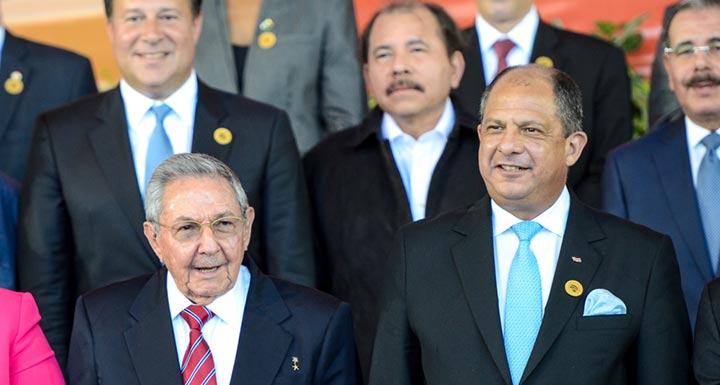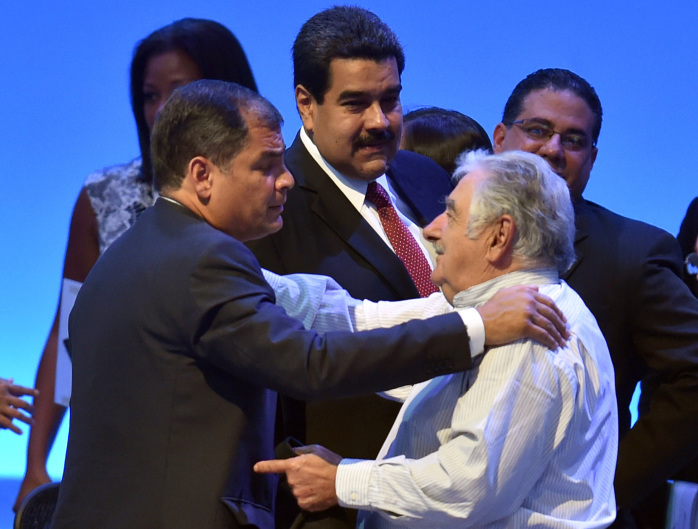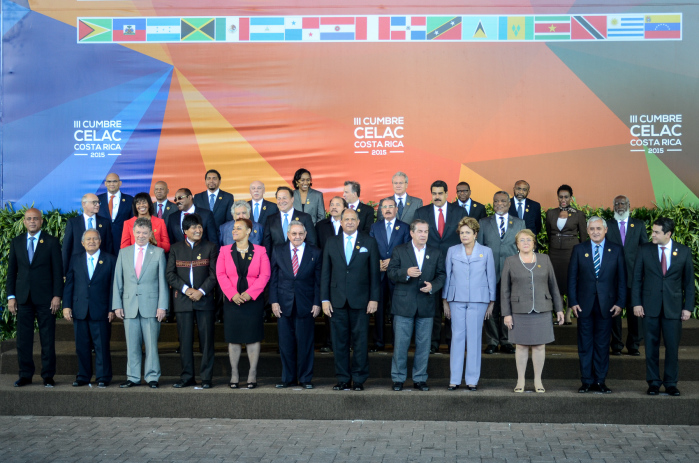
US not in attendance but very present at 2015 CELAC summit in Costa Rica
Cuban President Raúl Castro, left, and Costa Rican President Luis Guillermo Solís pose for a picture at the third annual summit of the Community of Latin American and Caribbean States (CELAC). Behind them stands Nicaraguan President Daniel Ortega, with whom Solís had a verbal flare-up during the summit / Alberto Font/The Tico Times.
The Community of Latin American and Caribbean States (CELAC) concluded its third annual summit in San José on Thursday, and while the United States did not have a representative present at the meeting, Uncle Sam was a hot topic.
Long simmering subjects like the U.S. embargo against Cuba were the focus of a special declaration from the bloc, and several leftist governments called for the U.S. territory of Puerto Rico to have a seat the table next year. President Rafael Correa of Ecuador, who assumed the presidency pro tempore of CELAC, applauded the idea in his speech Thursday.
The 2015 CELAC summit issued the Declaration of Belén Thursday afternoon, in which it largely reiterated its previous statements on both Puerto Rico and Cuba.
The Belén Declaration criticized the U.S. State Department for placing Cuba on its list of state sponsors of terrorism and insisted that the “U.S. president use his broad executive authority to significantly modify the embargo.”
The declaration gave a nod to Puerto Rican independence, repeating that it was a “matter of interest” for CELAC, but did not take a firm stance on the island’s status.

A Cold War mentality toward the United States could be heard in the speeches of leftist governments here, including Bolivia’s President Evo Morales, Ecuador’s Rafael Correa,President Nicolás Maduro of Venezuela, Nicaraguan President Daniel Ortega, and Cuban President Raúl Castro.
Despite the recent thawing of relations between the United States and Cuba, Castro was adamant that he would make no concessions regarding governance on the island, and demanded the U.S. return the Guantanamo Naval Base to Cuban control.
However, that’s not likely to happen, as the White House announced on Thursday that while it sought to close the Guantanamo prison, it would not cede control of the Naval base.
“The president does believe that the prison at Guantanamo Bay should be closed down,” said White House spokesman Josh Earnest. “But the Naval base is not something that we wish to be closed.”
The U.S. took control of Guantanamo following a treaty in 1903.
CELAC also issued a statement urging the U.S. to end its embargo against Cuba.

Nicaraguan Presidet Daniel Ortega broke with protocol Wednesday when he invited Puerto Rican independence advocate Rubén Berríos to speak at the plenary session in his stead.
Costa Rican Foreign Minister Manuel González said that Puerto Rico’s self-determination was a subject for Puerto Ricans to decide and not Costa Rica, during a press conference Thursday.
The bloc also released a statement condemning British control of the Falkland Islands (or Islas Malvinas, if you’re Argentine) off the coast of Argentina.
Costa Rican President Luis Guillermo Solís said he was pleased with the summit’s accomplishments, adding it was an honor to host the event, after passing the presidency pro tempore over to his Ecuadorean counterpart.
In his acceptance speech, Ecuador’s Correa highlighted five major themes for CELAC to tackle in the next five years: reducing extreme poverty and inequality, education and innovation, climate change, infrastructure investment and clarifying the bloc’s mission.
“Eradicating extreme poverty is a moral imperative for our region and the planet,” Correa said.
On climate change, Correa noted that all countries in Latin America were vulnerable to its vagaries, but especially Caribbean nations.
The Ecuadorean president also agued for a Latin American, Caribbean and “South-South” financial institution that could lend to member states without resorting to borrowing from U.S. banks or international lenders like the International Monetary Fund. He cited Argentina’s ongoing conflict with New York-financiers unwilling to accept the terms of its bankruptcy.
Besides hosting the plenary sessions on Wednesday and Thursday, Solís held bilateral meetings with Chilean President Michelle Bachelet, Bolivian President Evo Morales, Colombian President Manual Santos, Haitian President Michel Martelly, and representatives from Jamaica.
(From: The Tico Times)

